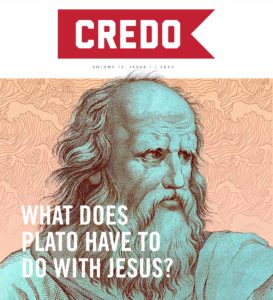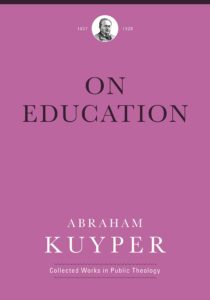
The Divine Purpose for Education
The latest issue of C redo Magazine focuses on Christian Platonism. The following is one of the issue’s featured book reviews by Gary Steward. Dr. Steward serves as Associate Professor of History at Colorado Christian University.
redo Magazine focuses on Christian Platonism. The following is one of the issue’s featured book reviews by Gary Steward. Dr. Steward serves as Associate Professor of History at Colorado Christian University.
Abraham Kuyper (1837-1920) is one of the few Christian theologians in the modern era who articulated a full-orbed political theology and labored to implement specific policies as a political leader of a nation. As the founder and leader of the Antirevolutionary Party (so named for its opposition to the ideology of the French Revolution) from 1879 to 1920, Kuyper worked out his Reformed theological convictions into a complete political program, serving as the Prime Minister of the Netherlands from 1901 to 1905. In addition to this, Kuyper wrote much in the area of theology and founded the Free University in Amsterdam in 1880.
Public Theology
So much of Kuyper’s work in the area of public theology and political thought has not been accessible in English until now. Thanks to the work of the Abraham Kuyper Translation Society and the Acton Institute, the Collected Works in Public Theology have now at last been made available in twelve large volumes that contain a trove of Kuyper’s thought on matters of politics and society. These volumes contain many pieces that have not been published before in English, and each volume contains helpful explanatory introductions that situate Kuyper’s thought within its historical context. The editors have gone to great lengths to make sure that the reader can work his way through Kuyper’s works and understand the significance of each piece in its historical and theological setting. In addition to this particular volume, O n Education, the Collected Works contain Kuyper’s Our Program (his political manifesto), Common Grace, Pro Rege, and other volumes with shorter pieces on the Church, Islam, business, economics, charity, and justice.
n Education, the Collected Works contain Kuyper’s Our Program (his political manifesto), Common Grace, Pro Rege, and other volumes with shorter pieces on the Church, Islam, business, economics, charity, and justice.
On Education contains a wide variety of Kuyper’s statements on education, drawn from political pamphlets, periodicals, speeches made as prime minister, addresses to university students, and encouragements offered to Christian teachers. The bulk of the selections in this volume contain the material that Kuyper produced in his almost fifty-year struggle (1869-1917) to give Dutch Christians the right to public funds to run Christian elementary schools and high schools for their children. Kuyper inherited his position on public education from his political mentor, Groen van Prinsterer. Van Prinsterer had initially supported the idea of a nationwide system of Christian public education, but he was forced to abandon this idea in 1857 when differing conceptions of Christianity made such a system impossible to implement (18). Kuyper, along with van Prinsterer, realized that increased ideological differences in modern society made state-imposed Christian uniformity in education an impossible goal.Under his leadership, Kuyper’s political allies were ultimately successful in securing government funding for a diverse system of public education, one which continues to remain fundamentally in place today. Share on X
The position Kuyper promoted for public education throughout his long career of public service was one of state-sanctioned ideological pluralism. The government should provide funds to groups of families with different ideological perspectives. Kuyper did not want to use the power of the state to impose a particular type of education upon the ideologically-diverse families of Holland. According to Kuyper, Dutch policymakers “have to do with two basic worldviews that sharply oppose each other. That being so, the power of the state must not be used in favor of one of them” (284). He instead wanted to give Christian parents the ability to organize and provide a thoroughly biblical education on an even financial playing field with the secular schools that were funded by the state. He fought to give the Christian children of Holland equal access to state-funded educational opportunities that would fit with their family’s religious perspective. Under his leadership, Kuyper’s political allies were ultimately successful in securing government funding for a diverse system of public education, one which continues to remain fundamentally in place today.
A Holy Pursuit
On Education contains many gems, including Kuyper’s two convocation addresses to the students of the Free University. Kuyper believed that the Christian university occupied a “distinctive sphere in society” as a “community of teachers and learners united in a single corporate body” whose purpose was to serve the needs of the broader society (100-101). Instead of living up to its mission, Kuyper bemoaned how the sphere of scholarship in his day had “lost its native impulse” and “tore up its charter,” such that many saw “no higher purpose in the academy than to assist its visitors as quickly as possible in preparing them for what is called a ‘position.’” He criticized the students who had it as their only goal “once and for all, and as quickly and cheaply as possible, to be done with bookish learning.” Such had come “in order to pursue ‘success’ but whose parched lips [had] never tasted one sip from the holy grail of scholarship” (102-103). Kuyper goes on in these addresses to lay out his understanding of a university education as a unique calling and holy pursuit.
Kuyper has been much talked about in recent years, but too seldom read. He understood the threat that secular ideology posed to Christian ways of thinking and viewing the world. He understood how the ideological conflict was working itself out in the debates over politics and society. Kuyper’s Collected Works of Public Theology have now made it possible for Christian laymen, leaders, and scholars to get some historic context for the challenges we are now facing from the godlessness of our day. Even though our contemporary context is slightly different, there is much from Kuyper that is thought-provoking, inspiring, and instructive.

